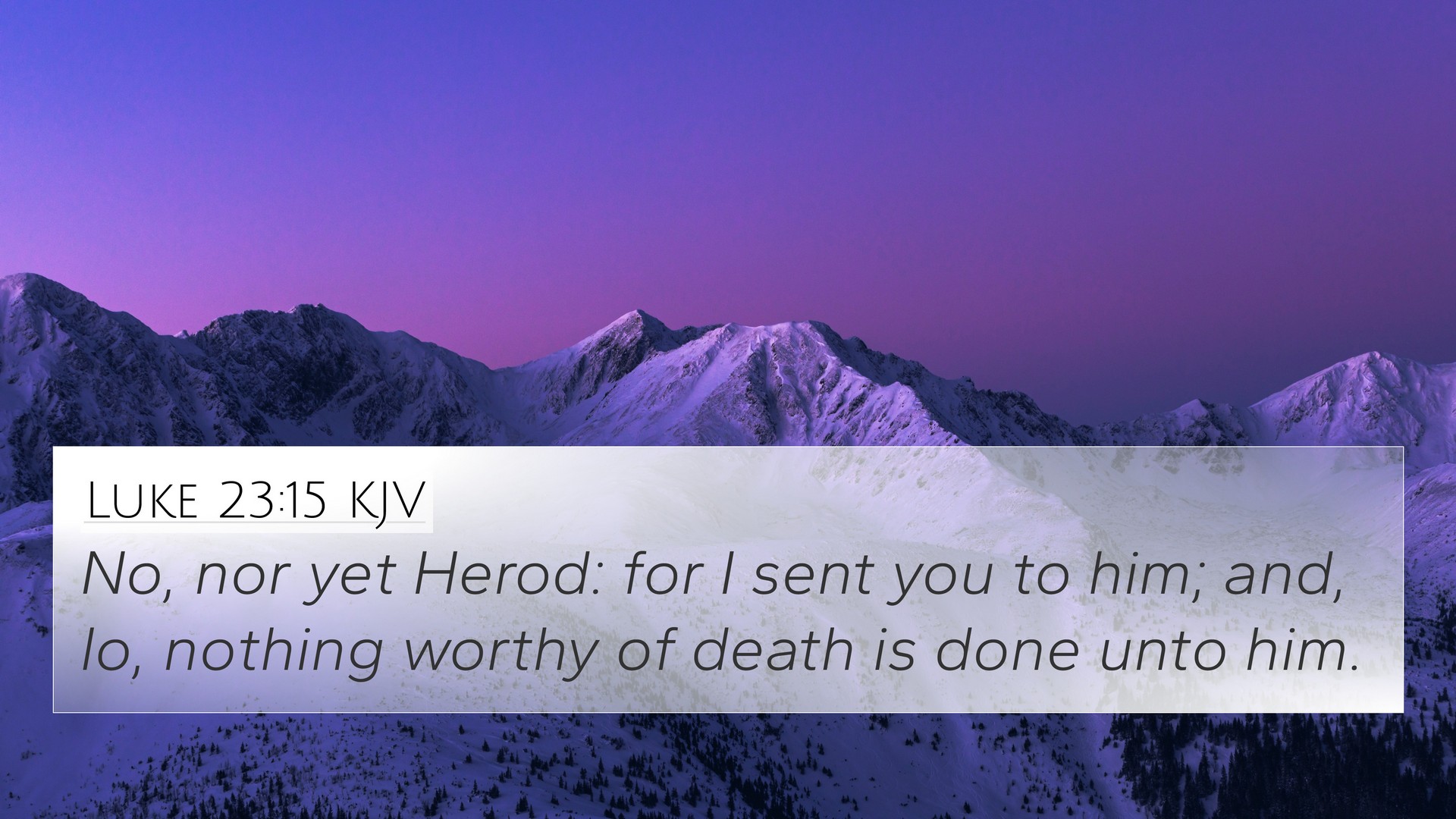Understanding Luke 23:15
Luke 23:15 states, "And Luke 23:15: "No, nor yet Herod: for he sent him to us; and, lo, nothing worthy of death is done unto him."
Overview of the Verse
In this verse, the focus is on the decision made by Pilate, in conjunction with the involvement of Herod concerning Jesus' trial. This moment signifies a pivotal point within the narrative of Jesus' crucifixion, highlighting both political and religious dynamics at play.
Commentary Insights
-
Matthew Henry:
Henry emphasizes the futile attempts to find a legitimate reason for condemning Jesus. Here Pilate acknowledges Herod's findings; despite the pressure, neither leader found any fault in Him. It reflects the innocence of Jesus amidst false accusations.
-
Albert Barnes:
Barnes points out that Pilate's declaration exposes the judicial system's attempt to placate a crowd that sought Jesus' blood. He stresses the importance of understanding that both political and religious authorities were relinquishing their moral duties.
-
Adam Clarke:
Clarke provides a detailed backdrop to this trial and indicates that the delivery of Jesus to Herod mirrored the rejection of divine authority. This verse is indicative of the greater significance of Jesus' innocence before a guilty world.
Theological Themes
This verse highlights a few themes fundamental to the Christian faith:
- Innocence of Christ: The repeated affirmations of Jesus' innocence underline the themes of divine justice and grace.
- Political and Religious Corruption: The collaboration of secular and religious powers against Jesus points to spiritual and social degradation.
- Fulfillment of Prophecy: The events leading to Jesus' crucifixion fulfill numerous Old Testament prophecies, reinforcing divine foresight.
Cross-References
In studying Luke 23:15, the following verses present valuable connections:
- Isaiah 53:7: "He was oppressed, and he was afflicted, yet he opened not his mouth..."—Foretelling Jesus' silence before His accusers.
- John 19:4: "Pilate went out again and said to them, 'See, I am bringing him out to you that you may know that I find no guilt in him.'"—Affirmation of Jesus' innocence by Pilate.
- Matthew 27:24-26: Pilate washing his hands signifies his intention to absolve himself from the decision to crucify Jesus.
- Acts 13:28: "And though they found in him no guilt worthy of death, they asked Pilate to have him executed."—Reiterating the innocence recognized by those in authority.
- Revelation 3:20: "Behold, I stand at the door and knock..."—The invitation to recognize Jesus' true nature beyond the political and religious rejection.
- Matthew 5:11: "Blessed are you when others revile you and persecute you..."—Connecting the themes of persecution with the treatment of Jesus.
- Luke 23:13-14: Providing context to the gathering of officials as they scrutinize Jesus’ actions and intentions.
Conclusion
The profound implications of Luke 23:15 resonate through its portrayal of Jesus' trial. The innocent Lamb faced injustice from both the political realm and the religious institutions, highlighting humanity's distance from divine truth. By understanding these connections and cross-references, one can appreciate how interconnected biblical narratives are and their significance in the overarching theme of redemption.
Further Study Tools
For those interested in digging deeper, the following tools for Bible cross-referencing can aid in exploring these connections:
- Bible Concordance: Useful for locating themes and connections across various scriptures.
- Bible Cross-reference Guide: A resource for finding related verses based on themes or keywords.
- Citing Cross-references in Bible Study: Understanding the context and linkages through systematic study.


